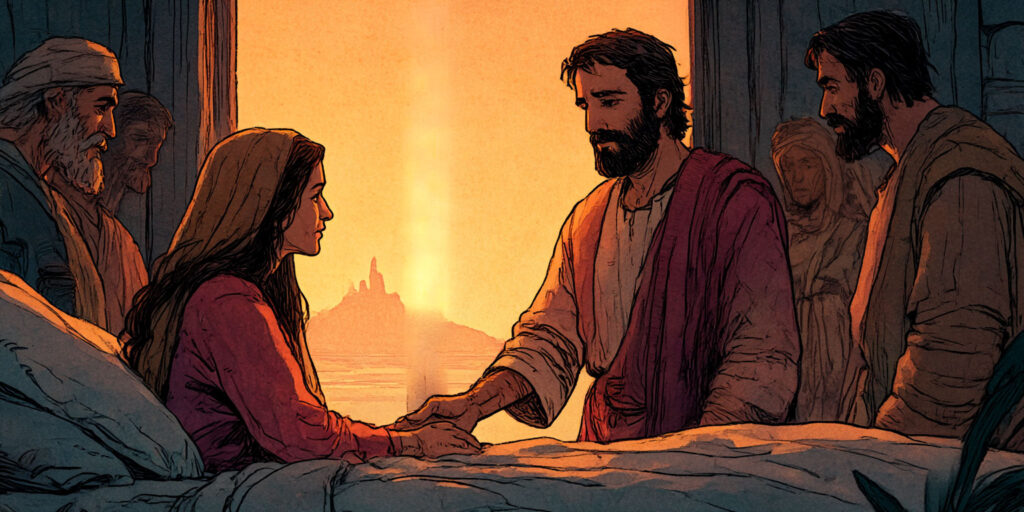
Peace
The gospel claims something bold: God offers real peace. Peace with Him, peace inside yourself, and peace with other people. But that peace isn’t automatic…

And he arose and left the synagogue and entered Simon’s house. Now Simon’s mother-in-law was ill with a high fever, and they appealed to him on her behalf. And he stood over her and rebuked the fever, and it left her, and immediately she rose and began to serve them.
Now when the sun was setting, all those who had any who were sick with various diseases brought them to him, and he laid his hands on every one of them and healed them. And demons also came out of many, crying, “You are the Son of God!” But he rebuked them and would not allow them to speak, because they knew that he was the Christ.
And when it was day, he departed and went into a desolate place. And the people sought him and came to him, and would have kept him from leaving them, but he said to them, “I must preach the good news of the kingdom of God to the other towns as well; for I was sent for this purpose.” And he was preaching in the synagogues of Judea.Luke 4:38-44
Jesus leaves the synagogue in Capernaum and steps into a home. Simon Peter’s mother-in-law lies with a high fever. He bends over her, rebukes the fever, and it leaves. She gets up at once and begins to serve. At sunset the town gathers—sick people, demon-oppressed, every kind of need. Jesus heals many, silences demons who know exactly who he is, and before dawn slips away to pray. When the crowd begs him to stay, he insists on moving on: “I must preach the good news of the kingdom of God to other towns also, because that is why I was sent.”
This brief scene carries a full pattern for Christian life: mercy, mission, and a sustainable rhythm.
The healing happens at the end of the Sabbath day. People wait until sunset to carry their sick because travel and lifting burdens were restricted. The point is not rule-keeping for its own sake; the Sabbath exists to give rest. Jesus fulfills the Sabbath by bringing whole-person rest—body and soul—not one day a week but as a new way of life.
Takeaway: Receive rest as gift, then extend it. If your practice of faith exhausts people, it is out of step with the Lord of the Sabbath.
Peter’s mother-in-law rises immediately and begins to serve. This is not domestic busywork tagged onto a miracle; it is the sign of full restoration. Grace returns her capacity to love in action.
Takeaway: The gospel does not end at “feel better.” It moves you from bed to table, from being helped to helping. A healed life becomes a serving life.
Luke highlights two streams of need—disease and demons. Jesus cures the first with compassion and confronts the second with authority. He will not let demons advertise his identity. No shortcuts. No borrowed hype. Truth will travel by proclamation, not by sensational headlines from unclean sources.
Takeaway: Jesus refuses marketing that distorts the message. So should his people. Let integrity, not noise, carry Christ’s name.
The crowd wants more miracles in one place. Jesus says no. “I must preach… to other towns also.” Healings are real mercy, but proclamation is the mission’s engine. People need more than relief; they need reality—God’s reign arriving in Jesus.
Takeaway: Meet urgent needs, but do not lose the message. The church fails if it does charity without gospel or gospel without charity.
After a long night, Jesus withdraws to pray. He guards communion with the Father and then moves on in obedience.
Takeaway: Build this pattern:
Serve generously. Pour out where God places you.
Slip away intentionally. Prayer is not a luxury; it is your lifeline.
Stay sent. Let God set your itinerary. Sometimes that means remaining. Sometimes it means leaving good work for the work you must do.
Bring Jesus home. Invite him into ordinary rooms—kitchens, sickrooms, family schedules. Faith is not only for the synagogue; it is for the house next door.
Name your next act of service. Who will experience “I rose and began to serve” because of you this week? Make it concrete and small enough to start today.
Tell what he has done. The delivered wanted to talk; so will you if you let Jesus work deeply. Share a simple “before/after/Jesus” story with one person.
Protect your prayer hour. If the Son needed solitude, you do too. Choose a time and keep it.
Keep the gospel central. Mercy ministries matter. So does the message that God’s kingdom has come near in Christ. Hold both together.
When Jesus steps into a house, people are restored, lies are silenced, purpose is clarified, and the day finds its right pace—work powered by prayer, mercy framed by mission. That is how a soul can be well when life is not.

The gospel claims something bold: God offers real peace. Peace with Him, peace inside yourself, and peace with other people. But that peace isn’t automatic…

Advent starts by asking us to slow down and look past the distractions. Every culture wraps Christmas in its own extras—traditions, shopping, decorations, sentimental ideas.

After Paul left Galatia, other teachers came. They questioned Paul’s authority and offered the Galatians a far more “comfortable” message…

Paul writes to a church he has never visited, yet he sounds like a pastor who knows them well: he encourages, challenges, and points every road back to Christ…

Biblical hope isn’t wishful thinking or daydreams. It is a confident expectation anchored in what God has already done in Christ and what he has promised to complete…